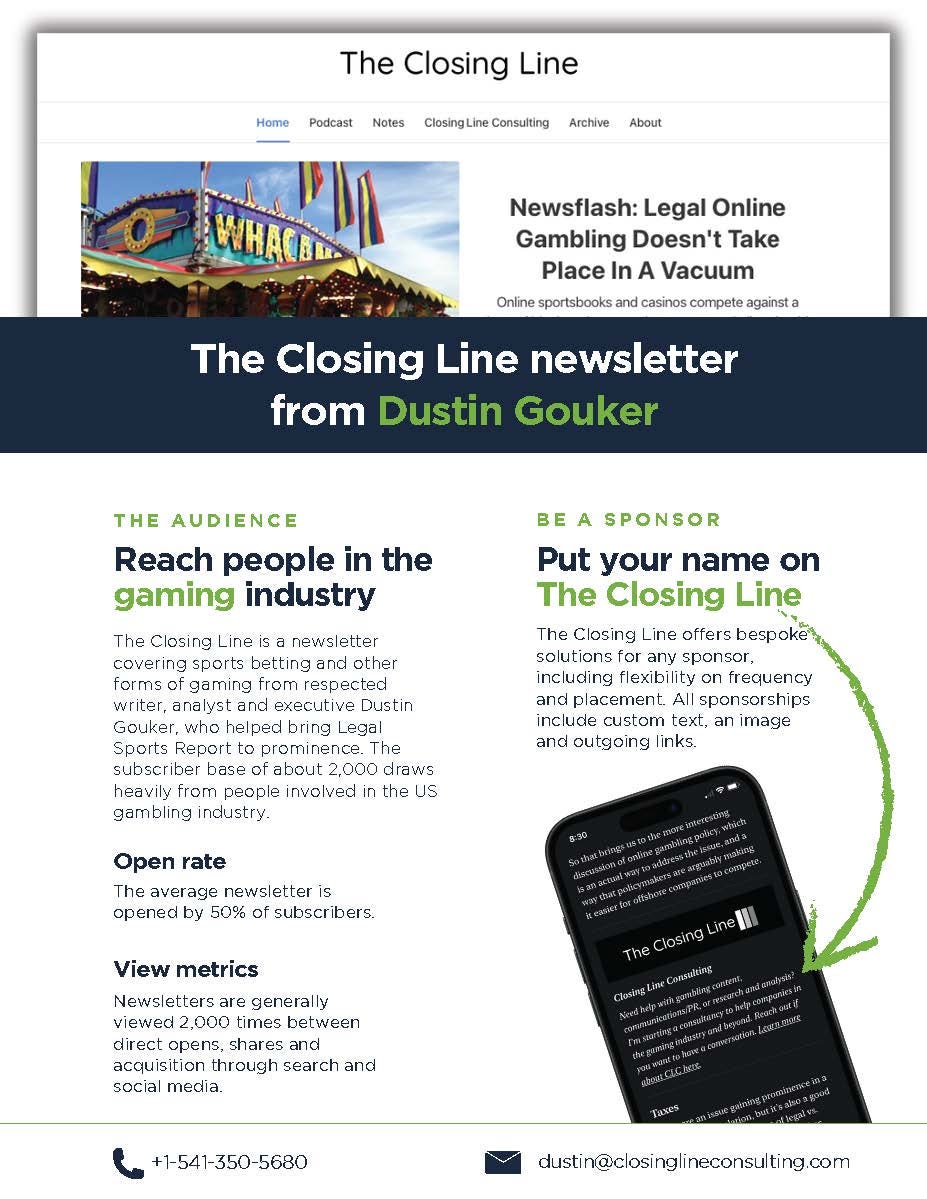TCL will offer a short piece on something new in the US gambling space in The Current every Tuesday.
I understand that many states legalized sports betting because it meant more tax revenue for states. But when we start talking about tax rates in excess of 50% around the country, I think we have started to lose the plot.
A Louisiana lawmaker wants to raise taxes on sports betting revenue from 15% to 51%; I touched on this briefly yesterday in The Early Line.
A tax rate this high in the US only exists in New York. Is 15% too low? Sure, I can buy that. Is 51% appropriate? I don’t think that’s a sustainable model for regulated sports betting if it were to continue to expand outside of NY.
Join 100s of operators automating their trading with OpticOdds.
Real-time data. Proven trading tools. Built by experts. Increase your GGR in just one month. Join top operators at www.opticodds.com.
Does it work in New York? You can argue it does, certainly. It generates a lot of tax revenue. But the operators were willing to pay the cost of doing business here because the alternative was not to be in the largest state with an open sports betting model.
If every state did this, I don’t think anyone would like the outcome. Here are some of the arguments against prohibitively high tax rates:
At some point, all this just gets passed onto the consumer/bettor. That could mean lots of things, including higher vig, fewer promotions, less investment in a better product, etc. If you’re OK with that as a policymaker, then have at it. But don’t act like the companies you are taxing are just going to eat it. It’s reminiscent of the current discussion around proposed tariffs on foreign goods in the US. DraftKings famously backed off a proposed surcharge on bets, but that’s certainly not the only way to pass costs onto the consumer.
We have to stop pretending legal sports betting occurs in a vacuum. When you continue to make it more and more expensive to do business as a legal sportsbook, you’re helping black and gray market options. Offshore sportsbooks don’t pay any of these taxes. If there continues to be no pushback on the sweepstakes model for sportsbooks, that’s going to continue to grow. The fantasy parlays/pick’em industry has found a measure of equilibrium legally and again doesn’t face these GGR taxes in most jurisdictions. All of these platforms are in some ways competition for legal sports betting. Policy should consider that fact.
Do you want competition in sports betting? We have already seen a variety of legal operators quit the market. If you keep making it more difficult for regulated sportsbooks to operate, we’re going to keep seeing contraction and consolidation, and certainly we won’t see new entrants. At the end, we might be left with perhaps less than a handful of major operators. Having more competition is better for the consumer; high taxes aren’t going to help foster more of it.
In any event, we’re going to see more of this discussion in other states. And yes, the sportsbooks kind of asked for it by agreeing to operate with a 51% rate in New York.
But I would love to see some thought put into policy that goes beyond “We can tax whatever we want, they have to pay it.” Expanded legal sports betting is still pretty new; let’s not make it terrible before it’s even reached its first decade of existence.
New since I published this:
Statement from Jeff Ifrah, Co-Founder of iDevelopment and Economic Association (iDEA) Regarding Louisiana House Bill 22
"The introduction of HB22, proposing a staggering tax increase on Louisiana's sports betting industry, marks a drastic and counterproductive shift in policy. This measure, if passed, will make Louisiana one of the highest-taxed sports betting markets in the country, significantly undermining the competitiveness of legal operators in the state. Such a sharp increase would not only raise costs for operators but ultimately impact consumers, who will bear the brunt through less favorable odds and reduced promotional opportunities.
Louisiana lawmakers have a long, constructive history of working collaboratively with industries to foster growth and benefit state economies without resorting to punitive tax hikes. Many of the state’s political leaders have historically championed economic stimulus through lower taxes on businesses and consumers. HB22, however, is out of alignment with these principles, risking a shift of betting activities back to unregulated and untaxed offshore markets—undermining the very goals of consumer protection and tax revenue generation that regulated sports betting was intended to serve.
If Louisiana seeks to increase revenues, the path forward should be to expand opportunity—not to suffocate a thriving industry that is already generating economic benefits. Legalizing and regulating online gaming would bring an unregulated activity into the fold of consumer protections and complement Louisiana's established land-based industry, providing a new and substantial revenue stream without additional burdens on businesses or consumers.
We urge Louisiana lawmakers to reject this misguided tax hike and instead pursue policies that stimulate economic opportunity and growth. By supporting a sustainable, consumer-focused sports betting market, Louisiana can continue to derive meaningful value from this industry for years to come."
Closing Line Consulting
Need help with gambling content, navigating the North American gaming industry, communications/PR, or research and analysis? I have a consultancy to help in gaming and beyond. Reach out if you want to have a conversation. Learn more about CLC here.
For sponsorship inquiries, email dustin@closinglineconsulting.com.








I’d be interested in your take on Zvi’s essay on “the great sports gambling experiment”.
https://thezvi.substack.com/p/the-online-sports-gambling-experiment